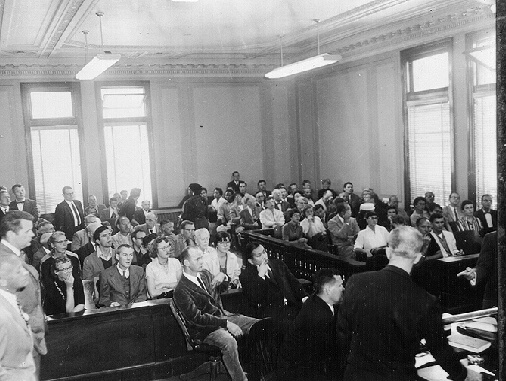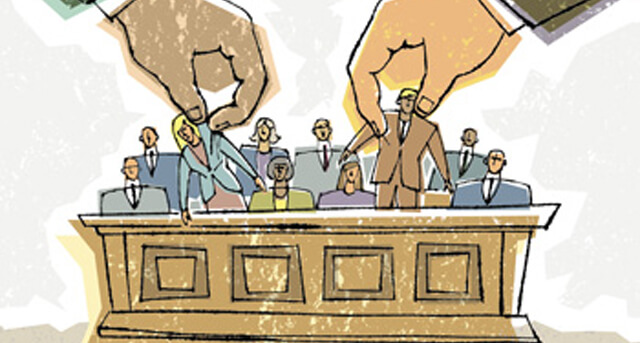
 The Sixth Amendment of the United States Constitution guarantees an accused the right to a public trial in all criminal prosecutions.
The Sixth Amendment of the United States Constitution guarantees an accused the right to a public trial in all criminal prosecutions.
Appellant Conrad Lilly, was charged with two counts of assault on a public servant while he was in prison. The trial court sua sponte convened his trial in the prison-chapel courtroom in lieu of the local courthouse. Appellant objected to his case being tried in the prison chapel and moved for a change of venue, arguing that his 6th Amendment right to a public trial was violated because “prisons are not open to the public and are more like military zones than public places.” The trial court denied his change of venue request and the 11th Court of Appeals (Eastland) affirmed.
To support his claim, appellant pointed out the following facts to show that, as applied in his case, the prison chapel trial violated his constitutional rights:
- The prison is protected by double razor fences, locked metal doors, and high-security procedures;
- Only people listed on an inmate-defendant’s approved visitor list could enter the branch courthouse to attend proceedings (only 10 names can appear on that list and the names can only be modified once every 6 months);
- Media and other members of the public would be prohibited from entering unless TDCJ officials in Huntsville preapproved the media’s request;
- People attempting to attend the proceeding could be denied entrance if they wore offensive clothing; and
- Unaccompanied minors and people released from confinement within the last two years are prohibited from entering the prison at all.
In this case, “the court of appeals held that Appellant’s trial was not closed to the public because there was no evidence that anyone was ‘dissuaded from attempting’ to attend, and no one was actually prohibited from attending his trial.” The Texas Court of Criminal Appeals disagreed with this analysis. The focus of the inquiry, the CCA explained, “is not whether the defendant can show that someone was actually excluded. Rather, a reviewing court must look to the totality of the evidence and determine whether the trial court fulfilled its obligation ‘to take every reasonable measure to accommodate public attendance at criminal trial.'”
[E]ven though many of the individual admittance policies in this case would not, standing alone, necessarily amount to a per se closure, the cumulative effect of the Unit’s policies undermines our confidence that every reasonable measure was taken to accommodate public attendance at Appellant’s trial.
Having found that Appellant’s trial was indeed closed to the public, the CCA further held that the trial court failed to make findings of fact on the record that justified closing Appellant’s trial. Because Appellant’s 6th Amendment right to a public trial was violated, the CCA reversed the judgments of the court of appeals and the trial court, and remanded the case for a new trial.
The CCA refrained from considering or commenting on whether prison trials are inherently violative of the 6th Amendment, noting that there could be occasions where a “public trial” is held in a prison.


 PROSECUTOR POST – Here is a helpful tip from a Texas prosecutor on Trial Advocacy in the criminal courtroom:
PROSECUTOR POST – Here is a helpful tip from a Texas prosecutor on Trial Advocacy in the criminal courtroom:
 If a criminal defendant takes the stand during trial on the merits and denies culpability, but then, after being convicted, chooses not to testify during the punishment phase of the trial, may the prosecutor comment during closing that the defendant has “not taken responsibility for the crime?”
If a criminal defendant takes the stand during trial on the merits and denies culpability, but then, after being convicted, chooses not to testify during the punishment phase of the trial, may the prosecutor comment during closing that the defendant has “not taken responsibility for the crime?”
 Much like the existential question about the tree falling in the forest, if something occurs during a session of court and there’s no court reporter around to hear it (or transcribe it), did it really occur? More importantly, if the losing party wishes to appeal a ruling that took place during the time when the court reporter was not around, can that party prevail? The simple answer, according to the Texas Court of Criminal Appeals, is NO.
Much like the existential question about the tree falling in the forest, if something occurs during a session of court and there’s no court reporter around to hear it (or transcribe it), did it really occur? More importantly, if the losing party wishes to appeal a ruling that took place during the time when the court reporter was not around, can that party prevail? The simple answer, according to the Texas Court of Criminal Appeals, is NO.
 When conducting voir dire of prospective jurors (the venire panel), Texas law says that a lawyer cannot ask a “commitment question.” The Texas Court of Criminal Appeals defines a “commitment question” as
When conducting voir dire of prospective jurors (the venire panel), Texas law says that a lawyer cannot ask a “commitment question.” The Texas Court of Criminal Appeals defines a “commitment question” as





